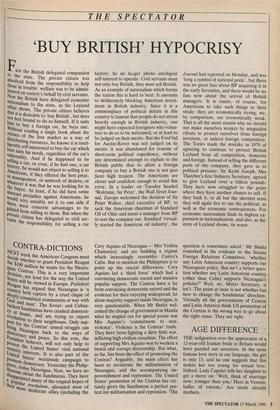THE SPECTATOR
'BUY BRITISH' HYPOCRISY
First the British delegated compassion to the state. The private citizen was absolved. from the responsibility to help those in trouble: welfare was to be admin- istered on society's behalf by civil servants. Now the British have delegated economic nationalism to the state, as the Leyland affair shows. The private citizen believes that it is desirable to 'buy British', but does not feel bound to do so himself. If it suits him to buy a foreign car, he buys one. Without reading a single book about the virtues of the free market as a way of distributing resources, he knows it is intel- ligently self-interested to buy the car which best suits his needs, regardless of the car's nationality. And if he happened to be selling a car, or even, if he had one, a car factory, he would not object to selling it to Americans, if they offered the best price, or management, or network of dealers, or Whatever it was that he was looking for in the buyer. At least, if he did have some abstract prejudice against Americans, he Would very sensibly set it to one side if there were concrete advantages to be gained from selling to them. But when the Private citizen has delegated to civil ser- vants the responsibility for selling a car factory, he no loger allows intelligent self-interest to operate. Civil servants must not only buy British, they must sell British. As an example of nationalism which harms the nation this is hard to beat. It amounts to deliberately blocking American invest- ment in British industry. Since it is a commonplace of political debate in this country to lament that people do not invest heavily enough in British industry, one might have expected foreigners who volun- teer to do so to be welcomed, or at least to be judged on their merits. But the Ford bid for Austin-Rover was not judged on its merits: it was abandoned for reasons of short-term political expediency, without any determined attempt to explain to the British public that to allow a foreign company to buy a British one is not ipso facto high treason. The Americans are clever and confident enough to avoid this error. In a leader on Tuesday headed 'Welcome, Sir Peter', the Wall Street Jour- nal, Europe welcomed the decision of Sir Peter Walter, chief executive of BP, to sack the American chairman of Standard Oil of Ohio and instal a manager from BP to sort the company out. Standard 'virtual- ly started the American oil industry', the Journal had reported on Monday, and wip, 'long a syinbol of national pride', but there was no great fuss about BP acquiring it in the early Seventies, and there would be no fuss now about the arrival of British managers. It is easier, of course, for Americans to take such things in their stride: they are economically strcing, we, by comparison, are economically weak. That is all the more reason why we should not make ourselves weaker by misguided efforts to protect ourselves from foreign investors, or indeed foreign competition. The Tories made the mistake in 1979 of agreeing to continue to protect British Leyland from all competition, domestic and foreign. Instead of selling the different parts of the company, they gave in to political pressure: Sir Keith Joseph, Mrs Thatcher's first Industry Secretary, agreed to give Leyland over a billion pounds. They have now struggled to the point where they have another chance to sell. If they funk it, in all but the shortest term they will again live to rue the political, as well as the economic consequences. For economic nationalism finds its highest ex- pression in nationalisation, and also, as the story of Leyland shows, its worst.


















































 Previous page
Previous page